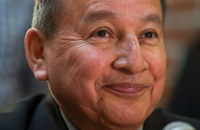
| Canadian Supreme Court Recognizes First Nation Land Title | 27 June 14 |

Source: CBC
The unanimous 8-0 decision released Thursday resolves many important legal questions, such as how to determine aboriginal title and whether provincial laws apply to those lands. The decision, written by Chief Justice Beverley McLachlin, also has implications for future economic or resource development on First Nations lands. "British Columbia breached its duty to consult owed to the Tsilhqot'in through its land use planning and forestry authorizations," the 81-page decision states. Grand Chief Stewart Phillip, president of the Union of B.C. Indian Chiefs, was with Chief Roger William, who brought the case, and other Tsilhqot'in chiefs when they learned of the top court's decision, and said the mood in the room was "absolutely electrifying." "We all heard the decision at the same moment, and the room just erupted in cheers and tears. Everybody is absolutely jubilant. It's very emotional," Phillip told CBC News. "It only took 150 years, but we look forward to a much brighter future. This, without question, will establish a solid platform for genuine reconciliation to take place in British Columbia." "I didn't think it would be so definitive," Phillip added. "I was actually prepared for something much less. It's not very often that I'm without words, and I'm quite overwhelmed at the moment." The decision rejected the narrow view of what qualified for protection under aboriginal rights from a 2012 ruling by the B.C. Court of Appeal. While the lower court had said aboriginal groups must be able to prove intensive historical use of a specific site, Thursday's decision accepts a broader set of criteria particularly important for the Tsilhqot'in, a historically "semi-nomadic" people. Indigenous groups must now prove a looser definition of occupation, continuity of habitation on the land, and exclusivity in an area in order to be granted a title. The Supreme Court of Canada currently has other similar cases to rule on, with the June 26th decision as a precedent. Analysis is beginning as to how this decision affects both provincial and federal governments and First Nations across Canada.
View June 26, 2014 CBC News article |
|
 Print version Print version |
Top |
